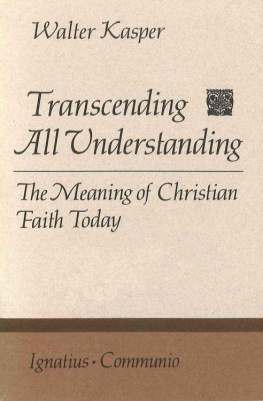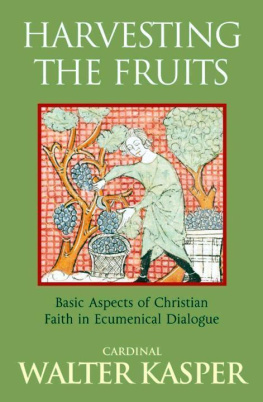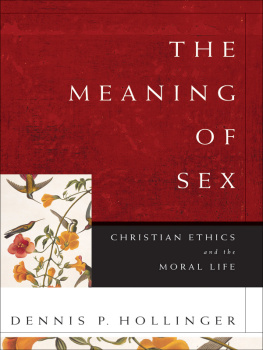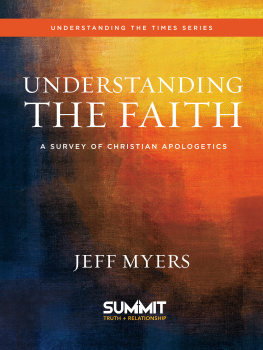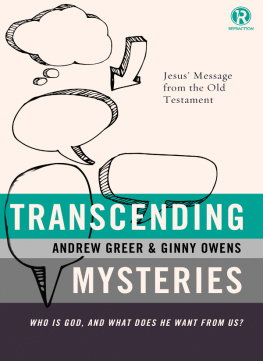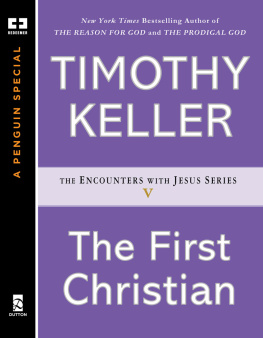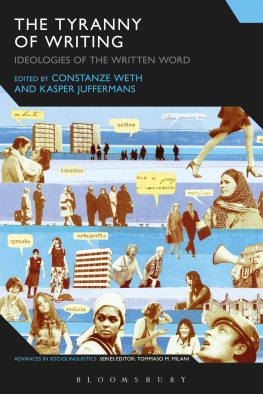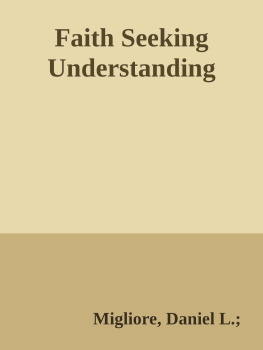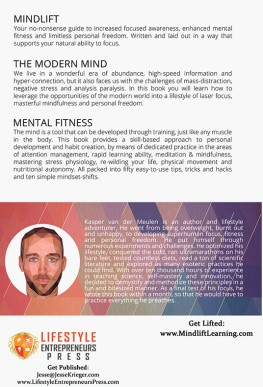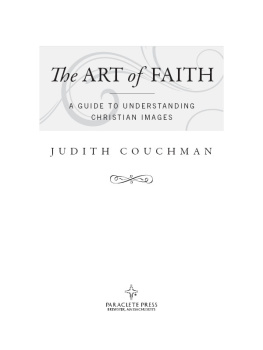Walter Kasper - Transcending All Understanding: The Meaning Of Christian Faith Today
Here you can read online Walter Kasper - Transcending All Understanding: The Meaning Of Christian Faith Today full text of the book (entire story) in english for free. Download pdf and epub, get meaning, cover and reviews about this ebook. year: 1989, publisher: Ignatius Press, genre: Religion. Description of the work, (preface) as well as reviews are available. Best literature library LitArk.com created for fans of good reading and offers a wide selection of genres:
Romance novel
Science fiction
Adventure
Detective
Science
History
Home and family
Prose
Art
Politics
Computer
Non-fiction
Religion
Business
Children
Humor
Choose a favorite category and find really read worthwhile books. Enjoy immersion in the world of imagination, feel the emotions of the characters or learn something new for yourself, make an fascinating discovery.
- Book:Transcending All Understanding: The Meaning Of Christian Faith Today
- Author:
- Publisher:Ignatius Press
- Genre:
- Year:1989
- Rating:3 / 5
- Favourites:Add to favourites
- Your mark:
- 60
- 1
- 2
- 3
- 4
- 5
Transcending All Understanding: The Meaning Of Christian Faith Today: summary, description and annotation
We offer to read an annotation, description, summary or preface (depends on what the author of the book "Transcending All Understanding: The Meaning Of Christian Faith Today" wrote himself). If you haven't found the necessary information about the book — write in the comments, we will try to find it.
Transcending All Understanding: The Meaning Of Christian Faith Today — read online for free the complete book (whole text) full work
Below is the text of the book, divided by pages. System saving the place of the last page read, allows you to conveniently read the book "Transcending All Understanding: The Meaning Of Christian Faith Today" online for free, without having to search again every time where you left off. Put a bookmark, and you can go to the page where you finished reading at any time.
Font size:
Interval:
Bookmark:
TRANSCENDING ALL UNDERSTANDING:
THE MEANING OF
CHRISTIAN FAITH TODAY
WALTER KASPER
Translated by Boniface Ramsey, O.P .
COMMUNIO BOOKS
IGNATIUS PRESS SAN FRANCISCO
Title of the German original:
Was alles Erkemen bersteigt:
Besinnung auf den christlichen Glauben
1987 Verlag Herder
Freiburg im Breisgau
Cover by Roxanne Mei Lum
With ecclesiastical approval
1989 Ignatius Press, San Francisco
All rights reserved
ISBN 0-89870-256-9
Library of Congress catalogue number 89-83497
Printed in the United States of America
To my father
on his eighty-sixth birthday
CONTENTS
A Burning Issue; Faith Itself Is Questioned; But What Does Faith Mean?; The Blurring of Outlines
Faiths Loss of Function; The Faith Critically Interrogated and Superseded; The Obscurity of God
A Situation That Stimulates Reflection; The Reasonableness of Faith; Reality as an Absolute; Faith Means Accepting Something on Anothers Testimony; Transcendental Faith; Antechambers of Faith
The Testimony of Holy Scripture; The Unity of the Act of Faith and the Content of Faith; Basic Attitudes of Faith; Faith as Way
Gods Revealed Truth as the Basis of Faith; The Eyes of Faith; An Analysis of Faith?; The Person Who Believes Sees More; Only Love Is Believable
The World as Creation; The Problem of Evil; The Message of Redemption
One Does Not Believe in the Church; One Believes within and with the Church; The Church as Sign and Instrument; The Church under the Word of God; An Infallible Church?; The Community of Faith Concretely Understood
FOREWORD
The following reflections come from different lectures given on various occasions. They were revised and reworked for publication. It goes without saying that they do not claim to be a complete presentation of what is customarily dealt with in a theological treatise on faith. They address a few obstacles to the clarification and deepening of personal faith in todays world. I am sincerely grateful to all those who by their questions, objections, suggestions and, not least, personal faith witness have contributed to producing these reflections.
Tbingen, on the Feast of the Epiphany of the Lord, 1987
Walter Kasper
TRANSLATORS NOTE
The German word Glaube , which appears throughout this work, can be translated as either faith or belief. It has been translated in these pages as the context seems to suggest, but where cither English word appears it is a rendering of the one German term.
This translation was done at the urging of Sister Miriam of the Cross, O.P., prioress of the Dominican Monastery of Mary the Queen in Elmira, New York. The translator wishes to thank her for her encouragement, and he offers his efforts to her as a token of friendship.
B.R .
A Burning Issue
The handing on of the faith is a problem almost everywhere today and has become a deep crisis. This is the burning issue for the contemporary Church. Despite the greatest efforts and the best will, faith is ever more in danger of evaporating in our modern and postmodern world. Less and less does it appear to be a determinative influence on life and reality. Its power to witness and its ability to be passed on seem to be growing weaker.
Not only numerous pastors and religion teachers but parents as well are asking: What is going to happen? How can we confront this crisis? Can we confront it at all? Every alert observer of Western society in particular can see a massive decline in religious practice and the disappearance of religious signs and symbols in the public forum. Believers find themselves nearly everywhere in a diaspora situation, standing guard at a forgotten post, so to speak.
Faith Itself Is Questioned
One thing seems certain: the crisis runs so deep and is so all-encompassing that it is not enough merely to call upon more effective and appealing methods and improved structures in order to hand on the faith. A discussion about external reforms is undoubtedly necessary, but it may not be conducted in a superficial way, for that would itself be a sign of diminished faith. It is not simply the handing on of the faith but faith itself that is in question today, not simply the how of its being taught but the what and why of faith. Faith itself is being challenged.
In this respect it is not only a matter of others faith or of the next generations faith. It is a matter of our faith! If it were more convincing, more infectious, more burning, then we would probably not have to be worried about its being handed on. What we need in particular, therefore, are living witnesses of faith. Only faith as it is lived is convincing.
Theologians have little to do with this. In such a situation theology can only offer modest assistance. A lived and living faith cannot be demonstrated to anyone; it must be witnessed to. In this respect a person can certainly argue carefully on behalf of faith and defend it against its intellectual adversaries. This is the way that the Christian is supposed to give an account of the hope that is in us (see 1 Pet 3:15). In addition, the theologian can attempt to reflect on the length and breadth, the height and depth of the mystery of Christ, who lives in our hearts through faith, and to expound the whole inner wealth of the faith. But while doing this he will see time and again that the love of Christ transcends all understanding (see Eph 3:17-19).
In what follows we want to pose the question in this decisive way: What does faith mean? What is faith about? What is our faith founded on? What do we believe in, as far as our faith is concerned? We are asking thus about the essence, act, content and basis of Christian belief. Finally, we are also asking about the community of believers, the Church.
But What Does Faith Mean ?
To put the question in this way is absolutely necessary. The word believe is very rich in possible meanings, even in everyday speech. If we say, for instance: I believe that it will rain tomorrow, what we mean is: I have some reasons, to be sure, but I am not certain. Belief here means a mere opinion and conjecture. Otherwise it can stand for credulity; blind faith; unenlightened, intellectually comfortable, authority-oriented behavior and even false belief and superstition. But the word believe can also express confidence, trust and fidelity. If I say, for instance: I believe you, then belief is linked not to some merely conjectured fact but to a person upon whom I bestow trust because I am certain of his trustworthiness. In this case belief does not express an unsure knowledge but rather a deep certainty founded on personal trust.
Belief is consequently a word with many possible meanings. Given these many meanings, the word believe can be misused. The legitimate and aberrant forms of beliefnamely, faith and superstitionare often close to one another and are frequently confused with one another. One can take advantage of the willingness to believe and the power of faith in young people in particular, thus abusing their trust. Totalitarian systems show that they are especially adept and subtle in this regard, and the new youth cults demonstrate the urgency of this danger even in our own society.
Not only is everyday speech multileveled in its use of believe , but so is religious and Christian speech. If a Christian confesses: I believe, he does not simply intend to say by this that God exists. Even the demons believe this, as the Letter of James says, and they tremble (see James 2:19). By saying such a thing a Christian is by no means expressing a lack of certain knowledge. On the contrary, he is declaring the highest personal certainty. His belief is a matter of fixity and content, touching on the foundation and goal of his existence. This trust, however, is based on the completely determined content of faithon faith in Gods history with mankind, on the Incarnation of God, on the cross and Resurrection of Jesus Christ and on the efficacious presence of Gods Holy Spirit in the word and sacrament of the Church. In faith, consequently, the act of faith and the content of faith must be distinguished. Augustine, in fact, differentiated three meanings of religious faiththe content-oriented belief that (credere Deum , to believe that God exists), the belief of trust (credere Deo , to believe God in the sense of trusting God) and the belief of the journey (credere in Deum , to journey toward God, and to do this in common with all the members of the Body of Christ).
Next pageFont size:
Interval:
Bookmark:
Similar books «Transcending All Understanding: The Meaning Of Christian Faith Today»
Look at similar books to Transcending All Understanding: The Meaning Of Christian Faith Today. We have selected literature similar in name and meaning in the hope of providing readers with more options to find new, interesting, not yet read works.
Discussion, reviews of the book Transcending All Understanding: The Meaning Of Christian Faith Today and just readers' own opinions. Leave your comments, write what you think about the work, its meaning or the main characters. Specify what exactly you liked and what you didn't like, and why you think so.

